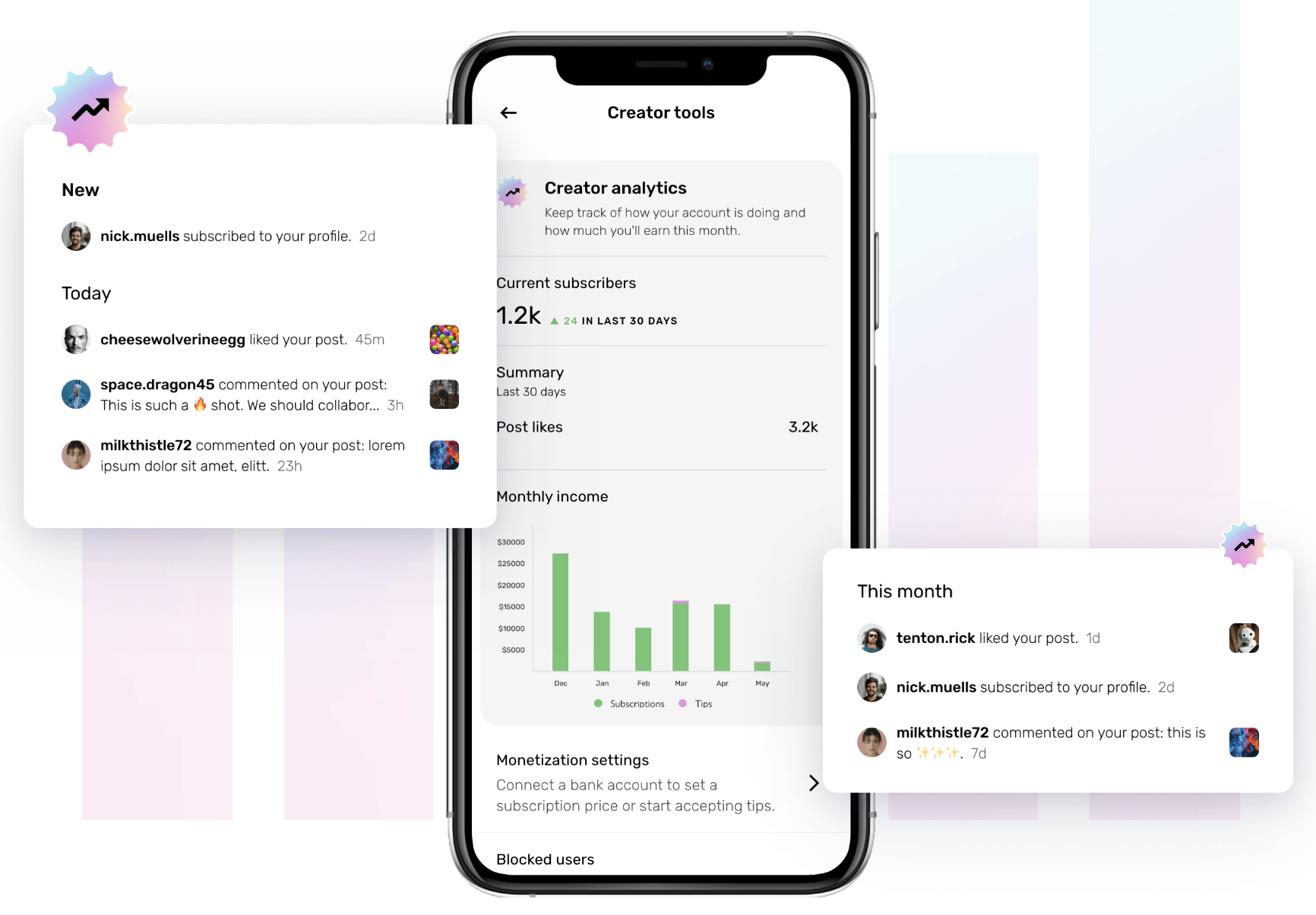More and more Gen Z users are hopping on the content creation train in an effort to earn a living beyond a regular 9-5 gig. According to a 2022 study by Adobe, around 45% of Gen Z creators surveyed said they want to earn money from their content.
However, given the recent drama surrounding major social media apps, with Meta discontinuing its monthly Reels Play bonus program and the potential TikTok ban, many creators are getting worried. Sixty percent of Gen Z creators use TikTok to monetize content, the study said.
Fanfix, a Patreon competitor that is focused on Gen Z creators and only allows clean content, may provide an extra revenue stream for creators. The subscription content monetization platform enables influencers to earn money directly from their followers.
Fanfix has attracted more than 10 million users — including 3,000 creators, the company claims. The average annual income for active creators is $70,000, its data shows.
As of this month, Fanfix says it paid out $11 million to creators so far, with projections to be at $50 million by the end of the year. It also claims a revenue run rate of $35 million and believes it will be profitable by Q1 2024, co-founder Harry Gestetner told TechCrunch.
The figures are notable for a two-year-old startup, especially when the current market makes it harder for creator-focused startups to succeed.

Fanfix is a web application where creators can create a membership, set a paywall and then post content behind the paywall. Creators can set their own subscription price, with the minimum cost being $5 per month and the maximum being $50.
Influencers can also earn even more with features like “Tip-to-DM” a pay-to-message feature that allows fans to pay between $3 to $500 to chat privately with their favorite creators.
Fanfix also recently launched a one-time purchases feature as well as a new message blast feature, where creators can reach out to all their subscribers at once.
Other features in the works include one-to-one calls, personalized videos and livestreaming.
Additionally, Fanfix has an analytics dashboard, allowing users to track their earnings, subscriber count and other performance metrics. This can be a useful tool if creators want to share metrics with brands and hopefully land opportunities.

The platform generates revenue by taking a 20% commission fee. This is a little high compared to a few competitors, such as Fanhouse, which only takes 10%. Patreon requires creators to sign up for one of its subscription plans, charging a monthly fee that ranges from 5% to 12%.
Although Fanfix doesn’t plan to lower the commission fee, the company pointed out that it has no hidden fees and offers a more “premium service” than most competitors, said Gestetner.
“If you look at other platforms, a lot of them charge the creators a payment processing fee. So, there are a lot of hidden fees, and we’re very transparent about how we monetize,” added co-founder Simon Pompan.
“Fanfix is one in this space that’s emerging as the leader in the clean Gen Z-first monetization space because our platform, very simply, has been the place where creators earn the most money,” Gestetner said. “Creators generally are very happy with the commission fee because they know that they’re earning more money on our platform than they do elsewhere.”

Gestetner and Pompan have been friends since high school and launched Fanfix in August 2021 when they were attending college. Shortly after launching Fanfix, Gestetner and Pompan brought Vine star Cameron Dallas onto the team.
The idea of Fanfix came about when Gestetner’s cousin blew up on TikTok, gaining tens of millions of views yet was unable to monetize. After doing some research, Gestetner found that a lot of creators were struggling to make money.
In general, the creator economy can be a tricky space to tackle — especially for full-time, smaller creators looking to make ends meet. Smaller creators seldom secure brand deals, let alone consistent ones that provide a stable revenue stream.
“Brand deals underserved a vast majority of creators, and there needed to be a way that creators could monetize directly from their loyal fans without having to rely on brands, agents, studios or record labels. There was a gap in the market for a clean, family-friendly Gen Z fan membership platform,” he said.
Fanfix’s target audience is 13 to 24 years old, so the platform has strict content guidelines and prohibits nudity as well as content that promotes illegal activities.
The platform makes sure to protect users and creators under 18 with additional safety features like report functions and human moderators that monitor private messages 24/7, as well as review creator accounts twice a day.
Regardless of a creator’s age, they can use the “safe mode” feature, which allows them to enable human-reviewed messages.
Overall, the entire platform is human-moderated.
Fanfix only accepts creators with a follower count of 10,000 or more. The creator must fit with Fanfix’s “brand image” and be able to convert.
We spoke with Savannah Rae Demers, a 22-year-old content creator who started using Fanfix in the spring of 2022. Demers said that, so far, she has made nearly $100,000 on the platform.
“My subscription rate is currently $8, which leaves me making around $6.40 from each subscriber per month,” Demers told us. “With around 2,100 subscribers, that is already about $13,500 a month just from subscribers. That does not even include additional tips and earnings from messaging.”
Fanfix hosts other successful creators, including Madi Monroe, Brooke Monk and Anna Shumate, among others. There is an average of approximately 200 Fanfix subscribers per creator on the platform, according to the company.
“I was immediately intrigued with the overall concept of this platform — having a place to document behind-the-scenes content and not having only brand deals to rely on sounded pretty great to me! Also having a place to truly chat and engage with my community of followers is super special to me and that is exactly what Fanfix gave me with the messaging side of the platform,” Demers added.

Gestetner and Pompan were only 21 and 23, respectively, when they sold Fanfix to SuperOrdinary in June 2022 for eight figures. SuperOrdinary partners with more than 140 brands, such as Farmacy, OLAPLEX, The Honest Company and more.
SuperOrdinary has its own e-commerce platform called GalaGala, which offers a selection of brands curated by influencers.
Eventually, Fanfix creators will be able to collaborate with SuperOrdinary to sell products in their own online stores.
“Being a part of Fanfix, these creators get access to the whole SuperOrdinary ecosystem. Whether it’s giving access to the brands or whatever it is, access to a system that really no other platform can provide,” Gestetner said.
In November 2022, the company launched SuperLink, a monetization-focused link-in-bio platform that displays a creator’s Fanfix page. Creators get 46% of the ad revenue.
Patreon competitor Fanfix launches ‘SuperLink,’ a link-in-bio platform aimed at Gen Z creators































Comment